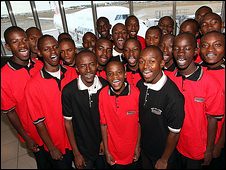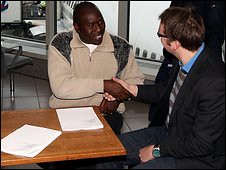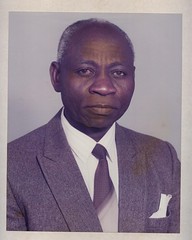GREENBURGH, N.Y. — When Salome Kosgei arrived at Kennedy Airport with only a change of clothes and a track scholarship, she stepped into a world she had never imagined. 
Courtenay Morgan Redis for The New York Times
Salome Kosgei placed a call to Kenya after winning a race in late December.

Courtenay Morgan Redis for The New York Times
Salome Kosgei set seven team records at Iona College and graduated with a degree in economics.
Smiling as she recalled her first “I’m not in Kenya anymore” moment, Kosgei said: “There was snow all over the place. Everything was white. This is country I’ve never seen. Wow! I remember trees were, well, dry. No leaves. This was most amazing to me.”
On that December morning in 2004, Kosgei did not anticipate becoming one of the fastest female runners inIona College history or graduating with an economics degree just as the financial crisis strangled markets around the world. And she did not foresee cradling an infant son on her first visit home.
Salome Kosgei (pronounced sah-LOM-ay KOSS-gay), who is about 5 feet 6 and weighs barely 100 pounds, has a fluid and elegant stride. When Kosgei, 28, won the Bermuda International Half-Marathon in early January, finishing nearly three minutes in front of her nearest competitor, she was driven by the same thought that pushes her to the trails each morning as she faces another day apart from her son, Michael — prove that the sacrifice is worth it.
Her dreams of becoming a great runner took seed on her family’s farm in the red volcanic dirt above 8,000 feet in the Keiyo District of Eldoret in northwestern Kenya. Kosgei was a quiet adolescent member of the Kalenji tribe, living in the shadow of the mountains above the Rift Valley, which is home to many fleet-footed East Africans. Of seven siblings, she was the only one to leave her village and attend college.
In her three years at Iona, Kosgei set seven team records, from the mile to the 10,000 meters. She was a nine-time regional champion, and the most outstanding female runner in the Metro Atlantic Athletic Conference in 2006. She reached her peak as an all-American in the 5,000 in early 2007.
At a meet in which Kosgei set Iona’s 5-kilometer record, 16 minutes 1.03 seconds, she “cruised, lapping everyone else at least once,” said her coach at the time, Mick Byrne, who now leads the men’s cross-country team at the University of Wisconsin. That qualified her for the 2007 N.C.A.A. indoor championships, where she finished eighth.
That spring Kosgei earned a spot in the 10,000 at the N.C.A.A. outdoor championships. But as the meet approached, her training was not producing results. Doctors at the New Rochelle, N.Y., campus eventually told Kosgei that she was pregnant.
“Sometimes in the families, you know, the ladies don’t have much freedom,” she said in December. “If they give the ladies such a freedom, they maybe get spoiled.”
Kosgei took a sip of water, then looked away as she continued.
“Spoiled like food that is not good,” she said. “Things can happen to ladies. And if you make a mistake, maybe you will not be able to express your talent. And then, maybe you become a burden to your brothers and they have you cut off” from the family.
She revealed the pregnancy in a call to her oldest sister, Ann, whose encouraging words brought relief and solace.
Kosgei declined to identify the father, who provides no regular child support, but said counselors at Iona and at the Pregnancy Care Center, where she lived with other single mothers close to campus, offered help.
She also relied on Mike Barnow, her coach with the Westchester Track Club, whose top runners are primarily East Africans. He and Kosgei spoke daily about her training, her health and her concerns.
When Kosgei woke after a Caesarean section on Nov. 7, 2007, she found the reality of motherhood both beautiful and terrifying.
“I was so scared,” she said. “I cannot be prepared for this, I was thinking.”
Barnow, who figured a return to training would help untangle her emotions, talked Kosgei into running again. Four weeks after giving birth, she started with walking, then jogging easily. Within two months she was running daily for more than an hour.
Although her training was going well, her student visa and the center’s policy required her to work or attend school. The staff could not grasp that running was her job.
In January 2008, ethnic violence after a national election killed more than 1,200 in Eldoret. While her family remained safe in their village, many in her tribe were dead or injured. Kosgei could not go home immediately, but she knew she would eventually accept her family’s help in rearing Michael.
The turning point for Kosgei came in New York last June. She placed 10th in a high-caliber women’s field at the New York Mini 10K. It included the race winner, Hilda Kibet, a Dutch citizen born in Kenya; Madaí Pérez, Mexico’s leading marathoner; and the three American qualifiers for the Olympic marathon in Beijing, Deena Kastor, Magdalena Lewy Boulet and Blake Russell.
“That really gave me the motivation — that if I can run this big race and come in 10th, I know I can make it,” Kosgei said.
Like many immigrants, at least 30 high-caliber East African athletes toil in low-wage jobs in the New York metropolitan area, sending money home to ailing parents and multiple siblings. Runners are like day laborers — they work even when they are sick, no matter the weather, without health insurance or a steady paycheck.
Kosgei must train twice a day and, like most professional runners just below elite status, resist the temptation to run too much to eke out a living. Racing well means money in the pocket, but an injury from overuse can end a career.
Unable to afford child care while training and racing, Kosgei had few options. Barnow offered to pay her way home — and back.
“Salome never asked me, but I understood what she was thinking,” Barnow said.
Kosgei prayed and talked it over with her sisters. Last July she flew home with Michael.
Twelve excited relatives met them at the Nairobi airport and took the five-hour bus ride to Eldoret. Over the next eight weeks, Kosgei answered the villagers’ many questions about the United States.
“ ‘Tell us about crops, cattle, farm machinery,’ they all ask,” Kosgei said. “At that time I have no answers. I never saw such things in America.”
In September, Kosgei returned alone on a tourist visa. (She has applied for a P-1 visa, for internationally recognized athletes and entertainers.) Her younger sister, Naomi, offered to raise Michael alongside her two young daughters, for the time being.
“I would never want anyone, any friend, to live this sacrifice,” Kosgei said, holding back tears. “It is the most difficult thing I have ever done. It still affects me so much to be this great distance from my son.”
She lived temporarily with five other Kenyan runners crammed into a two-bedroom apartment in the Bronx. Then a local newspaper article prompted MaryElizabeth Murray to invite Kosgei to stay free in a private suite in her Greenburgh home. After a big snowstorm, they decorated the Christmas tree and shoveled the driveway, another first for the Kenyan.
A 10-minute walk and a short bus ride deliver Kosgei to her favorite running trails at the Rockefeller Preserve in Tarrytown. Some days she trains with the team in Van Cortlandt Park in the Bronx, averaging 70 miles a week.
Kosgei is climbing the ranks on the national level. At a 10-kilometer race in California over Thanksgiving, she finished in front of Lewy Boulet, earning $2,250 for a course-record victory in 32:27. In late December she won the Millennium Mile in 4:36 after leaving home at 4 a.m. for a seven-hour bus ride to Londonderry, N.H.
Once she is consistently earning enough money, Kosgei said, she will bring Michael here and maybe pursue a graduate degree, or perhaps live and train in Kenya but race internationally.
After making her weekly call home, she glanced at the snow falling outside. Kosgei said she hoped she was making the best choices for her family.
“They say, maybe, you make a mistake, but you can still do good in life,” she said. “If you have a talent, a gift, you can still achieve it.”
A version of this article appeared in print on February 6, 2009, on page B9 of the New York edition.















